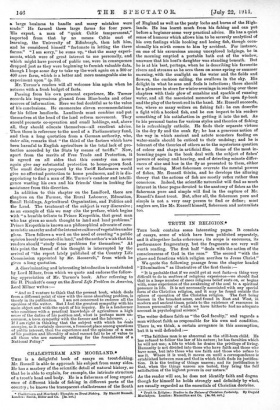CHALKS TRE AM AND MOORLAND.* THIS is a delightful book
of essays on trout-fishing. Mr. Russell is able to approach his subject from many sides. He has a mastery of the scientific detail of natural history, so that lie is able to explain, for example, the intricate structure of a trout's head and body. He is a fisherman of long experi- ence of different kinds of fishing in different parts of the country ; he knows the transparent chalkstreams of the South
• Chalkstreant and Moorland : Thoughts on Trout Fishing. By Harold Russell. London : Smith, Elder and Co. [5e net.]
of England as well as the peaty lochs and burns of the High- lands. He has learnt much from his fishing and can put before a beginner some very practical advice. He has a quiet sense of humour which allows him to be severely analytical of his own feelings while hooking and losing fish, though occa- sionally his mirth comes to him by accident. For instance, on one of his excursions among unexplored lodgings, he in the morning emptied a portable bath out of the window, unaware that his host's daughter was standing beneath. But he is at his best, perhaps, when he is describing his favourite rivers and streams as he sees them on some spring or summer morning, with the sunlight on the water and the fields and flowers, the cuckoos calling, the swallows in the sky. His delight in what he sees and feels is infectious; there should be a pleasure in store for winter evenings in reading over these chapters with their glow of sunshine and sparkle of running water, and all the associated memories of the open fly-book and the play of the trout-rod in the hand. Mr. Russell succeeds, too, where so many writers on fishing fail: he can describe a fight with a hooked fish, and he can impart to his readers something of his satisfaction in getting it into the net. As to his personal tastes for various styles and theories of fishing he is refreshingly catholic. He finds their separate virtues in the dry fly and the sunk fly; he has a generous notion of the way in which ancient and astute monsters feeding on water-snails should be enticed to their undoing; and he is tolerant of the theories of others as to the mysterious question of colour and shape in artificial flies. Some of the most in- teresting pages in the book deal with the subject of fishes' powers of seeing and hearing, and of detecting minute differ- ences of size and hue in the fly as presented to them, either wet or floating. Most fishermen overrate the mental powers of fishes, Mr. Russell thinks, and he develops the alluring theory that the actions of fish are mostly reflex rather than conscious. Indeed, the scientific naturalist will find as much interest in these pages devoted to the anatomy of fishes as the fisherman pure and simple will find in the capture of Mr. Russell's finest trout. But, after all, the fisherman pure and simple is not a very easy person to find or define ; most anglers are, like Mr. Russell himself, fishermen and naturalists too.






































 Previous page
Previous page